What is ghost fishing?
An estimated 640,000,000kg of fishing gear is lost or abandoned (derelict) in oceans globally every year, killing an estimated 136,000 seals, sea lions and whales, not to mention countless other organisms including birds and fish. This phenomena is called ghost fishing. Abandoned gear can continue to trap and kill animals for upwards of hundreds of years, wreaking havoc on marine ecosystems. Nets scrape rocks and reefs, physically harming the ocean, and create long-term damage.
Puget Sound
Puget Sound in Northern Washington has a long history of fishing, and has many outcroppings and rocky reefs that easily snag nets, causing a high rate of lost fishing gear in the area.
Derelict gillnets that had been intended to capture Pacific salmon in Puget Sound have been found to contain valuable catch that are not normally targeted by gill nets, such as crabs and other fish, as well as seabirds and mammals of high conservation concern. The Northwest Straits Commission, a regional conservation initiative that works closely with scientists, estimated in 2007 that over 4000 nets litter the Puget Sound sea floor. As a result, they formed the Northwest Straits Derelict Gear Initiative in 2002 to address the massive issue of derelict gear plaguing the waters of Puget Sound.
WATCH: Underwater survey of species entanglement in Puget Sound, WA
The Northwest Straits Derelict Gear Initiative:
What are they doing?
The Northwest Straits Initiative worked with the State of Washington to change the legislation related to derelict gear removal. If they hadn’t done this, they would have had to apply for a permit for each individual net they wanted to take out. Considering the thousands of nets in Puget Sound this would have been incredibly tedious and time consuming.
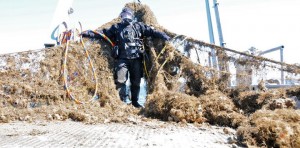
Northwest Straits diver with a removed net from Puget Sound. Image source: Northwest Straits facebook.
Once the proper legislative changes were in place, the Northwest Straits Initiative carried out extensive surveys of Puget Sound and decided where they would prioritize their net-removal efforts. Their plan was based on a priority ranking system that considered both the environment and budgeting. A single net can take 3-4 days and up to $15,000 (USD) to remove, making the prioritizing process essential. As much as possible, the recovered nets are recycled, and any leftovers are taken to the landfill.
To stop new nets from making their way into Puget Sound and becoming derelict, the initiative created a no-fault reporting, response and retrieval system. This system allows for people to report lost gear without getting in trouble and gets divers and biologists out on the water as quickly as possible to remove gear before too much damage is done.
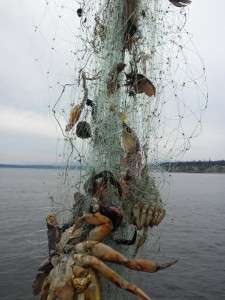
A recovered gillnet with entangled species. Puget Sound, Washington. Image source: Northwest Straits facebook.
How are they doing?
As of September 2014, the Northwest Straits Initiative has removed 5083 derelict nets, over 3500 crab pots and 53 shrimp pots from Puget Sound. The group estimates that the removal of this derelict gear is saving over 3.5 million organisms every year from becoming entangled in lost fishing gear. Additionally, recent research has shown that sites where derelict gear has been removed can recover to almost 90% of pre-net conditions within one year of removal.
WATCH:Divers remove derelict gear in Puget Sound, WA
The group has done extensive research on cost-benefit analysis, and have done an excellent job of prioritizing their efforts in Puget Sound. While net removal is an extremely expensive endeavour, studies have shown that the value of Dungeness crab alone which could be lost in a single derelict net over its lifetime, is approximately 14 times the cost of net removal, making the high cost worth the effort
While the Northwest Straits Initiative is doing excellent work at locating and recovering lost fishing gear in Puget Sound, much more work is needed. Once the group meets their goal of removing 90% of shallow water gillnets by 2015, they still face the arduous task of addressing deepwater gillnets and tens of thousands of lost crab pots in the area. The Northwest Straits Initiative represents an efficient and effective effort to remove derelict fishing gear in Puget Sound. They are an excellent example of how to deal with derelict gear and should be looked to by organizations around the world for addressing the problem of global ghost fishing.
For more information, visit the Northwest Straits Initiative website: derelictgear.org
Northwest Straits Initiative on Facebook
Report lost or abandoned fishing gear in Puget Sound
Follow the authors on twitter:

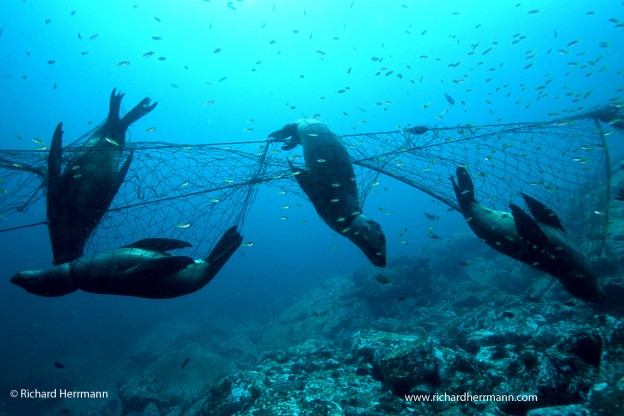
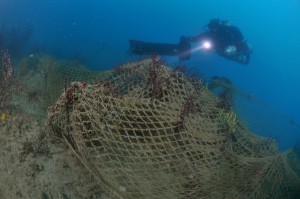
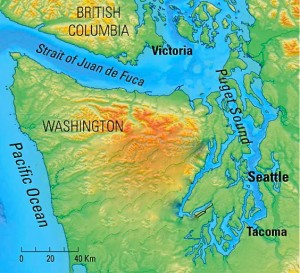
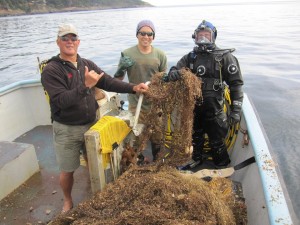
Warm, gentle, funny, sometimes sad, these twelve stories weave common themes into a variety of patterns, each distinctive and yet related to the rest. These themes—the humor and folktales of the rural Midwest, the bonds between generations and the friction those bonds create, the tensions between a character’s country past and city present—are at once archetypically American and specific to each story’s particular reality. As the title suggests, many of the stories in Fishing for Ghosts have to do with remembrance and loss, and as Richard Brown points out in the book’s foreword, it will sometimes be natural for the reader to confuse the narrators with the author. But none of these stories are purely autobiographical; rather, Brown infuses his storytelling with the authenticity of his own experiences, and the result is a narrative voice that is genuine, playful, as rich as the good Missouri soil it springs from, and absolutely his own